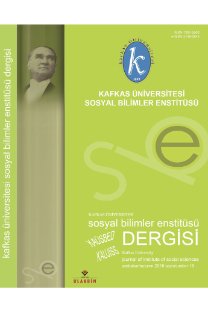GEÇMİŞ ZAMANIN TARİHSEL ÜSTKURMACASI: KENDİNİ MEYDANA GETİREN ROMAN TO WHOM IT MAY CONCERN
Postmodern tarihsel anlatılar, tarihçeyi büyük bir anlatı olarak reddederek, kendindenbilinçlive kendini yansıtıcı, üstkurgu, kendini meydana getiren (kendi oluşumunu anlatan)ve üstkurmaca gibi yeni deneysel anlatıları ortaya çıkarır. Bu makalede sunmayaçalıştığım, Raymond Federman'ın yazar-anlatıcının yazım sürecini işleyen To Whom ItMay Concern adlı kendini meydana getiren (kendi oluşumunu anlatan) romanında,postmodernizmin dille oyununun geçmişi yeniden inşa etmede ve yeniden yazmasında nasılönemli bir rol oynadığıdır. Tarihin gerçekliği, tarihin kimin objektifinden anlatıldığınabağlıdır. Bu makalede öne sürdüğüm en önemli nokta, metnin her okunduğunda nasılyeniden yazıldığı gibi geçmiş ya da tarih de gerçekten hatırlandığı her zaman yenidenyazıldığıdır. Tarih yeniden anlatıldığı sürece başka bir tarih olmaya devam eder. Buçalışmanın amacı, Raymond Federman'ın gerçekliği ve kurgusu, geçmişi ve gerçekliği,tarihi ve kurguyu, kurguyu ve gerçekliği bulanıklaştıran tarihsel üstkurmaca olan ToWhom It May Concern romanını analiz etmektir.
hiSTORiographic Metafiction of the Past Time: A self-begetting novel To Whom It May Concern
selfconscious and self-reflexive as surfiction, self-begetting and metafiction by rejecting history as a grand narrative. I will attempt to present in this article how postmodernism’s playfulness on language plays an important role in reconstructing and rewriting the past in Raymond Federman’s self-begetting novel To Whom It May Concern which weaves the writing process of the author-narrator. The reality of history depends on whose lens of the hiStory is narrated. The crucial point I can assert in this article is how the text is rewritten every time it is read and the history or past is also rewritten every time it is actually remembered. As long as the history is retold it continues to be another history. The aim of this study is to analyse Raymond Federman’s historiographic metafictional novel To Whom It May Concern which blurs fact and fiction, past and reality, history and fiction, fiction and reality. Keywords: metafiction
___
Barnes, J. (1989). A history of the World in 101/2 chapters. London: Picador.Cornis-Pope, M. (2001). Going to BEthiCKETT on the way to heaven: The politics of self-reflection in postmodern fiction. Henry Sussman and Christopher Devenney (Ed). Engagement and Indifference: Beckett and the Political (pp. 83-111). Albany: State University of New York Press.
Culler, J. (1989, 1982). On deconstruction: Theory and criticism after structuralism. Ithaca, New York: Cornell University Press.
Di Leo, Jeffrey R. (2011). Other voices: The fiction of Raymond Federman. Di Leo, Jeffrey R. (Ed).
Federman`s Fictions: Innovation, Theory, Holocaust (pp. 1- 38). Albany: State University of New York Press.
Federman, R. (1993). Critifiction: Postmodern essays. Albany: State University of New York Press.
Federman, R. (1990). To whom it may concern. Boulder: Fiction Collective Two.
Federman, R. (1995). The supreme indecision of the writer: The 1994 lectures in Turkey. Ankara: The Poetry/Rare Books Collection. 1995.
Freiburg, R. & Schnitker, J. (Ed). (1999). Do you consider yourself a postmodern author?. Interviews with Contemporary English Writers, Münster: LIT.
Greenblatt, S.. (1989). Invisible bullets. Robert Con Davis and Schleifer Ronald (Ed). Contemporary Literary Criticism: Literary and Cultural Studies (pp. 474-506). New York, London: Longman.
Hutcheon, L. (1980). Narcissistic narrative: The metafictional paradox. Canada: Wilfrid Laurier University Press.
Hutcheon, L. (1988). The politics of postmodernism. London: Routledge.
Hutcheon, L. (1989). Historiographic metafiction: Parody and intertextuality of history. Patrich O'Donnel and Robert Con Davis (Ed). Intertexuality and Contemporary American Fiction (pp. 3-32). London: John Hopkins University Press.
Hutcheon, L. (2002). Politics of postmodernism. 2nd ed. London: Routledge.
Kellman, S. G. (1976). The fiction of self-begetting. MLN, 91(6), 1243-1256. doi: 10.2307/2907134.
Mallarme, S. (1993). Federman on Federman: Lie or die (fiction as autobiography/autobiography as fiction). Raymond Federman (Ed). Critifiction Postmodern Essays (pp.85-100). Albany: State University of New York.
Sim, S. (2005). The Routledge Companion to Postmodernism. London: Routledge.
Waugh, P. (1984). metafiction; the theory and practice of self-conscious fiction. London: Routledge.
White, H. (1978). The historical text as literary artifact. Robert H. Canary and Henry Kozicki (Ed). The Writing of History: Literary Form and Historical Understanding (pp. 41-62). Madison: University of Wisconsin Press.
- ISSN: 1307-5500
- Yayın Aralığı: Yılda 2 Sayı
- Başlangıç: 2008
- Yayıncı: Kafkas üniversitesi Sosyal Bilimler Entitüsü
Sayıdaki Diğer Makaleler
GEÇMİŞ ZAMANIN TARİHSEL ÜSTKURMACASI: KENDİNİ MEYDANA GETİREN ROMAN TO WHOM IT MAY CONCERN
MAADAY-KARA DESTANI’NDA ŞAMANİST DÜNYA TASARIMI
Elif BİLGİNOĞLU, Hava YAŞBAY KOBAL
YUSUF KILIÇ, SUZAN AKKUŞ MUTLU
URARTULARDA DERİ VE DERİ İŞLEMECİLİĞİ
GAZETE KÖŞE YAZILARININ TANIKLIĞINDA “ÇEVİRİCİ”
KUZEYBATI İRAN’DA YER ALAN HAFTAVAN YERLEŞMESİNE BİR BAKIŞ
NOTRE-DAME DE PARİS ROMANINDA ENGELLİ VE ÖTEKİ ALGISI: QUASİMODO ÖRNEĞİ
